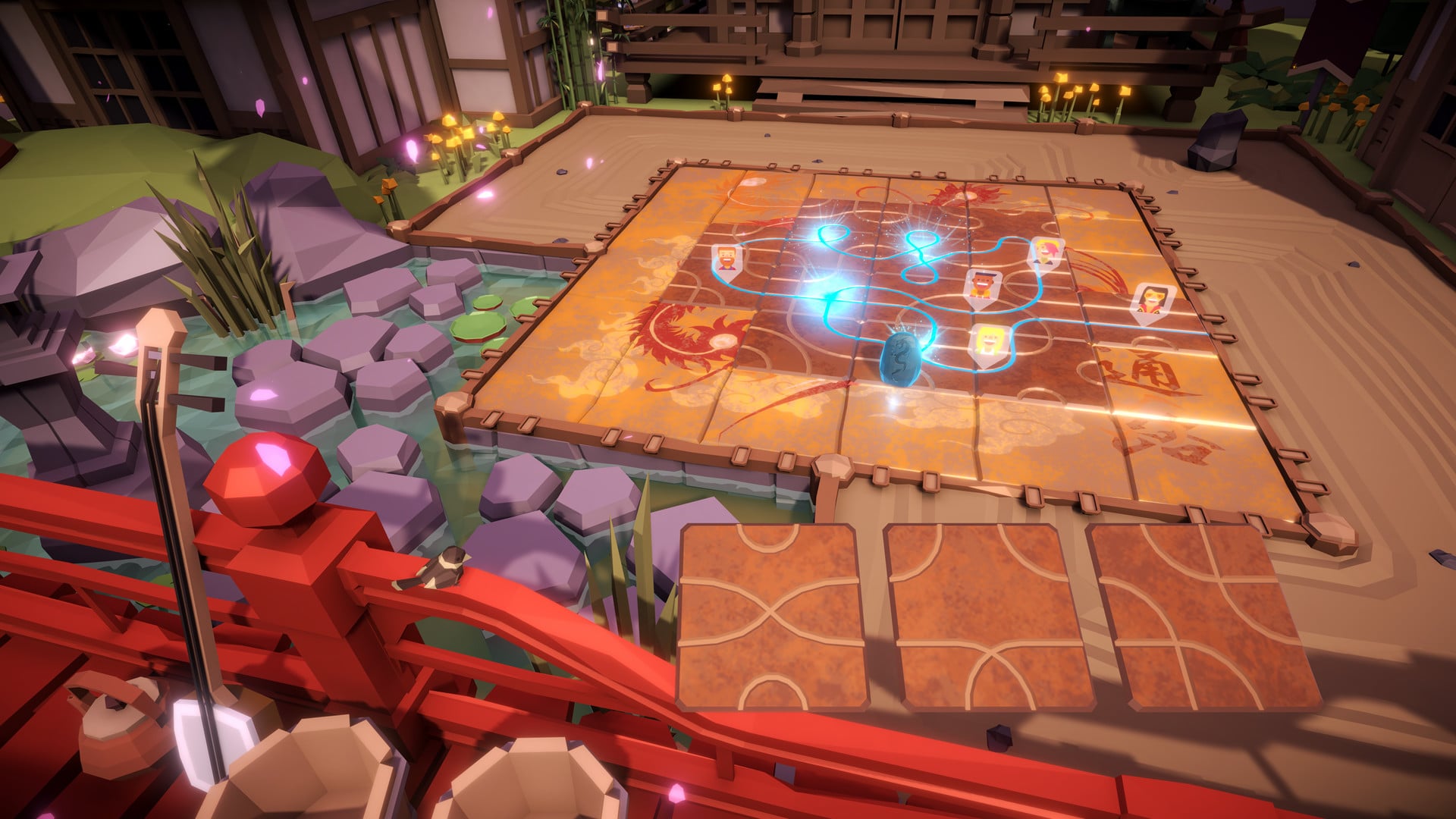The meditative board game comes to Oculus Quest mostly intact, but some issues may make you lose your cool. Here is our full Tsuro VR review.
The board game of Tsuro: The Game of the Path has a simple premise. You must lay tiles down to keep your stone traveling a path, choosing from a hand of three tiles, without running into the walls of the board or into an opponent. And while it is a simple premise at first, putting down tiles on a six by six grid, as the board fills up and you have to see how your tiles connect with those already placed down, it becomes harder and harder to find a way to connect to an existing path that keeps you alive and not looping through several tiles until you hit the end and burst.
Thunderbox Entertainment brought this solid board game, originally designed by Tom McMurchie, to iOS and Android in 2016. Last year, they released it for Steam VR. But now last month month, they have brought the game to all Oculus platforms, from Rift to Go, but here I am reviewing the Oculus Quest version using a Quest 2.
Whenever a board game makes the jump from actual tabletops to a virtual one, there are three questions one must ask: (1) How well does this port reflect the original game? (2) What did they add to improve the game beyond the original? and (3) And how well does this port support the social aspects of board games?

To begin, Thunderbox has done a fair job in translating the game to VR. The gameplay is intact, letting you play versus up to 7 AI opponents or 3 real opponents online. You can even play in a solo mode without opponents, where you have to get through all 35 titles without dying.
While the iOS version of the game used just a straight digital replica of the real-world pieces on a blank canvas of a table, the VR version transports the game into a simple representation of a Japanese garden placed inside some castle walls: there are pagodas standing tall, sakura trees blowing cherry blossoms, a bridge over a stream, bamboo and plants, a fox and some birds. In the center is the board sitting on a stone platform on a patch of sand.
Using the Touch analog sticks, the player can teleport around on the sand, the bridge, or even high on a pagoda balcony, to see the game at different angles and viewpoints. Relaxing music with an old-Japan feel fills the air. It is a bit cliche, but also comfortable and reflects the zen-nature of the original board game.
Interestingly, moving around the area to obscure corners of our setting provides some easter eggs, creating something of a quick little scavenger hunt to enjoy. Though the company made the strange choice of having some of the hidden things give you a dialog box with a link that will jump you out of the immersive game into the Oculus browser to see ads for their other games.
Beyond this new graphical representation, how does this improve on the board game? Beyond the obvious convenience of not having to move and clean up real game pieces, there are some new things that fans of the original will find. The first obvious one is that you can play the game by yourself, against up to 7 AI opponents. In the beginning, you may choose from a “Silly” AI, but then with a few wins, you can unlock a “Clever” AI and a “Tricky” AI to ramp up difficulty.

Beyond the original win condition of th last player standing, there are two other win conditions you can unlock: most loops in your path and longest path. Providing some variant rules in a board game is always a great way to get more mileage out of it.
The other thing Thunderbox added to this virtual version of Tsuro is online play. This is where the company tries to reproduce the social aspects of playing a board game with friends.
The online play is cross platform, allowing you to play against both mobile, Steam, and other Oculus versions of the game. You can be matched randomly, or play with friends, either from your friend list or those you can find via email address. There is both a two-player duel mode and a four-player mode. There doesn’t seem to be any voice support in-game, so players will have to be in a separate party outside the game to get that social interaction.
This is where this digital version of Tsuro becomes problematic. Despite the Quest version being a new game, and playing on a weekend, for me, there were few players to be found. Despite trying all weekend, I was unable to get a live game going.
I found myself in 10 different games being played in slow motion–I would make a move, then come back a few hours later to find my opponent had made a move and I could finally continue the game. This exchange replicated the old “play-by-mail” systems people used to use before the Internet existed. Which seems helpful, but it also stretches a 10- to 15-minute game to days, if not weeks.

The lack of players meant that at one point, when I had 10 such turn-based games going, three of them were against the same player, two were against others, and five were just waiting for challengers. By the end of the weekend, after trying to get a live game going several times, I had 20 different matches happening at a crawl.
This is all to say, that online play of the game against strangers is unreliable right now and it is unclear if it will ever improve. People looking for an exchange of moves that emulates the original board game may want to stick with playing with friends.
Another small issue is that Tsuro is a simple, quick game and Thunderbox could have given this virtual version more value by adding material from the two sequels of the original board game: Tsuro of the Seas and Tsuro: Phoenix Rising, but they did not. Perhaps there will be downloadable content in the future?
Tsuro VR Review Final Verdict
All this being said, if you want an immersive version of an entertaining and simple game, Tsuro is a good choice. The graphics are solid, the gameplay is there with some nice variants, and you will enjoy playing against AIs, at least for a little while.
If you are fine with being limited to playing against friends who have also bought the game, or don’t mind that content from the sequels aren’t present, then feel free to add another star to this review. But for myself, the zen nature of it all got old quickly when I couldn’t really play with others.


For more on how we arrive at our scores, check out our review guidelines.
Tsuro VR from Thunderbox Entertainment is available on the Oculus Home store for Rift and Quest at a price of $9.99 and the Oculus Go or Gear VR for $4.99. It’s also available on all major PC VR headsets via Steam for $9.99. This review is based on the Oculus Quest 2 version.







